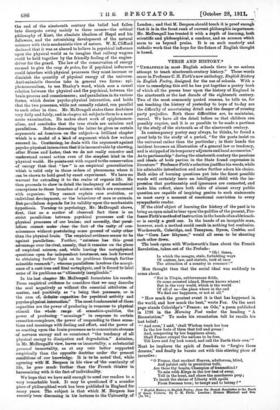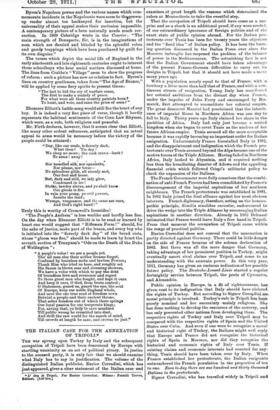VERSE AND HISTORY.*
"UNHAPPILY in most English schools there is no serious attempt to teach nineteenth-century history?' These words occur in Professor C. H. Firth's new anthology, English History in. English Poetry, designed for the use of schools. With a view to remedying this evil he has put together a poetry book of which all the poems bear upon the history of England in
the nineteenth or the last decade of the eighteenth century. Two of the most commonly quoted reasons, he tells us, for not teaching the history of yesterday to boys of to-day are the difficulty of ascertaining detail and the danger of rousing party prejudice. Both these difficulties are, he maintains, unreal. We have all the detail before us that children can possibly require, and it is as possible to be made a partisan by the study of the sixteenth as of the nineteenth century.
In contemporary poetry may always, he thinks, be found a great help to the study of a period, "for the poets insist on the universal rather than the particular ; in their hands the incident becomes an illustration of a general law or tendency, and is stripped of its temporary adjuncts and local accessories."
As to partisanship " during the nineteenth century the passions and ideals of both' parties in the State found expression in literature." Professor Firth's selection justifies his words, while his admirable introduction and notes further adorn his choice.
Both sides of burning questions put into the finest possible words will certainly leave an• intelligent child with the im- pression that partisanship and ignorance are connected, and make him reflect; since both sides of almost every public question are capable of inspiring genius to such statements as must carry a moment of emotional conviction to every sympathetic reader.
If 'the chief object of learning the history of the past" is to bring an open mind to bear upon'the politics of the present, Pro- fessor Firth's method'of instruction in the hands of an able teach- er is surely a good' one. In the hands of an incapable man, however, such a method could result in nothing but confusion. Wordsworth, Coleridge, and. Tennyson, Byron, Crabbe, and the " Corn. Law Rhymer," would all seem to be shouting each other down.
The book opens with Wordsworth's lines about the French Revolution, taken out of the Prelude : " Oh ! times,
In which the meagre, stale, forbidding ways
Of custom, law, and statute, took at once The attraction of a country in romance !"
Men thought then that the social ideal was suddenly to come about.
"Not in Utopia, subterranean fields,
Or some secreted island, Heaven knows where !
But in the very world, which is the world Of all of us—the place where in the end We find our happiness, or not at all."
" How much the greatest event it is that has happened in the world, and how much the best," wrote Fox. On the next page stands Coleridge's " France: an Ode," a poem published in 1798 in the Morning Post under the heading " A Recantation." To make his recantation tell he recalls his
lost belief :
" And soon,' I said, 'shall Wisdom teach her lore
In the low huts of them that toil and groan !
And, conquering by her happiness alone, Shall France compel the nations to be free, Till Love and Joy look round, and call-the Earth their own.'"
Next he implores the spirit of freedom to "forgive these dreams," and finally he bursts out with this stirring piece of invective : "0 France, that mockest Heaven, adulterous, blind, And patriot only in pernicious toils,
Are these thy boasts, Champion of humankind? To mix with Kings in the low lust 'of sway, Yell in the hunt, and share the murderous prey; To insult the shrine of Liberty with spoils From freemen torn; to tempt and to betray ? "
• English History in English Poetry: from the French Reasolutkm to the Death of Queen Victoria. By C. H. Firth. London: Horace Mar' shau and Son [2s. 6d.]
Byron's Napoleon poems and the various names which com- memorate incidents in the Napoleonic wars seem to theigrown- up reader almost too hackneyed for insertion, but the universality of their appeal makes their exclusion impossible. A contemporary picture of a'hero naturally needs much cor- rection. In 1809 Coleridge wrote in the Courier : "The main strength of Bonaparte, Sir, is in the imaginations of men which are dazzled and blinded by the splendid robes and gaudy trappings which have been purchased by guilt for its own disguise."
The verses which depict the social life of England in the early nineteenth and late eighteenth centuries ought to interest those schoolboys who hear social matters discussed at home. The lines from Crabbe's " Village" seem to show the progress of reform : such a picture has now no relation to fact. Byron's lines on country gentlemen, taken from "The Age of Bronze," will be applied by some fiery spirits to present times;
"The last to bid the cry of warfare cease, The first to make a malady of peace.
For what were all these country patriots born P To hunt, and vote,And raise the price of own?"
Ebenezer Elliott's battle-song would still fire the heart of any boy. It is indeed a very fine piece of verse, though it hardly represents the habitual sentiments of the Corn Law Rhymer, which were, as a rule, both religious and peaceful.
Mr. Firth declares, however, that it seems clear that Elliott, like many other ardent reformers, anticipated that an actual appeal to arms would be necessary before thevictory of the people could be attained:
"Day, like our souls, isteroely dark,
What then? 'Tis day !
We sleep no more; the cock crow s—hark ! To arms ! away!
Nor tasaelled silk, nor •epaulette,
Nor plume, nor tome—
No splendour gilds, all sternly met, Our foot and horse.
-But, dark and still, we only glow,
Condensed in ire 1 Strike, tawdry slaves, and ye shall know Our gloom is fire. In vain your pomp, ye evil powers, Insults the land;
Wrongs, vengeance, and the cause axe ours,
And God's right hand ! "
Truly this is worthy of Cromwell's Ironsides !
"The People's Anthem" is less warlike and hardly leas fine. On the day when Ebenezer Elliott is to be read or learned by heart one would suggest that "Riflemen Form!" should, for the sake of justice, make part of the lesson, and every boy who is initiated into the "fiercely dark day" of the bread riots, whose "gloom was fire," should be made to learn by heart the seventh section of Tennyson's "Ode on the Death of the Duke of Wellington ": " A people's voice! we are a people yet.
Tho' all men else their nobler dreams forget, Confused by brainless mobs and lawless Powers; Thank Him who irled us here, and roughly set His Saxon in blown seas and storming showers, We have a voice with which to pay the debt
Of boundless love and reverence and regret
To those great men who fought, and kept it ours.
And keep it oars, 0 Ged, from brute control ; O Statesmen, guard us, guard the eye,'the soul Of Europe, keep our noble England whole, And save the one true seed of freedom sown Betwixt a people and their ancient throne, That sober •freedom out of which there springs Our loyal passion for our temperate kings; For, saving that, ye help to save mankind Till public wrong be crumbled into dust, And drill the raw world for the march of mind, Till crowds at length be sane, and crowns be just.'











































 Previous page
Previous page